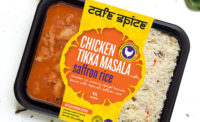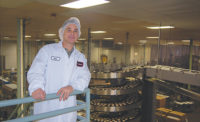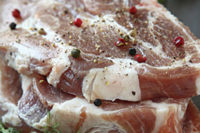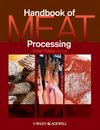“My family has always been pioneers in the turkey breast industry, and I’d like to carry on that legacy and come out with something’s that’s quite unique and geared to health and wellness,” said Forde, founder and president of Turke’s Omega-3 Gourmet Foods, headquartered in Swedesboro, N.J.
He’s not exaggerating about his family legacy. In the 1940s, Forde’s uncle, Emil Gontowski, was the first in the United States to develop and sell a cooked, processed turkey breast. Forde worked in the turkey business with most of his family, and when it came time to create a new business for himself, he looked for a healthier product.
Omega-3 fatty acids, particularly the DHA and EPA types found in Turke’s Omega-3 gourmet turkey breast, have many health benefits, including reduced cholesterol, decreased risk of heart disease and diabetes, and lowered triglycerides. They are found primarily in fish, Forde notes, but he points out that more Americans eat deli meat than fish. Each 2-ounce serving of Turke’s Omega-3 gourmet turkey breast has 125 mg of Omega-3 DHA/EPA.
“This is one way to give people in the United States something that they’re lacking in their diet – Omega-3 – and also to differentiate ourselves from all the other players out there and come out with something unique,” Forde says.
In coming up with the product, he started with one of his Uncle Emil’s old recipes. Finding a company that could supply pharmaceutical-grade Omega-3 was especially important.
“Omega 3 has a tendency to go rancid if it’s not formulated correctly,” he notes.
Once he found a supplier, he went to John F. Martin & Sons, located in Lancaster County, Pa., to process the turkey breast. The actual production involves mixing the Omega-3 emulsion together with the turkey brine, which is then injected into the whole-muscle turkey loaves.
“Then we take the 2000-pound batch into a vacuum tumbler and tumble it to get an even dispersement of the Omega-3 and brine in the turkey,” Forde explains.
The company spent about seven months developing the product, and it has been available for about a year. The gourmet turkey breast is available in several health food stores and has been picked up by SYSCO. John Forde sees this item as the start of a much larger line of products. One possibility would be to enrich deli meats with other types of nutrients, as well as expanding its Omega-3 line.
“We also want to incorporate the Omega-3 into roast beef, smoked ham, and we want to expand into potato salad, coleslaw, condiments – anything to do with the deli,” he says. “Maybe the barbecue category as well.”








Report Abusive Comment